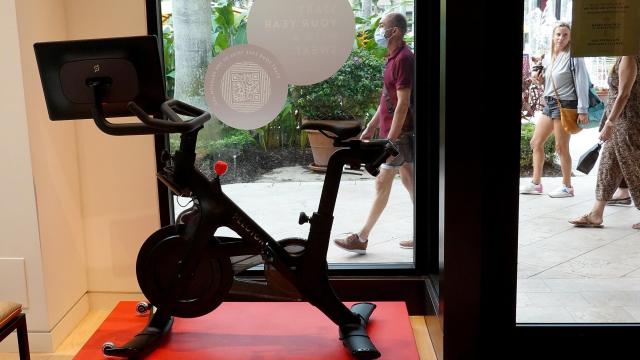Peloton is sprinting full-force away from the manufacturing end of its business. The announced changes come after months of being hammered in the markets while un-bought bikes cluttered up its warehouses.
The company announced Tuesday it was exiting all manufacturing and instead inking further deals with the Taiwanese company Rexon to handle building its exercise equipment. Despite previous earning calls pointing to a company that’s struggled hard to keep afloat in a tough year for tech companies, the fitness bike maker called getting out of manufacturing “a natural progression.”
It’s as “natural” as anything for a company that aims to hook users with its video-based workout routines tied to the company’s bikes. This move is just another part of CEO Barry McCarthy’s previously-announced plans to get Peloton running on stable footing. The company had switched heads back in February at the same time it announced it was laying off 20% of the company, around 2,800 jobs.
“We believe that this along with other initiatives will enable us to continue reducing the cash burden on the business and increase our flexibility,” McCarthy said in the release.
The company had previously split the task of manufacturing between itself and other companies, including Rexon. The fitness company had been working with Rexon for years, according to Andy Rendich, Peloton’s chief supply chain officer. He said in the release that Peloton will keep 100 staff in Taiwan “who continue to play a key role in our engineering and manufacturing strategy.”
On the other side of Peloton’s bikes is the screen and computer hardware, which according to Bloomberg will continue to work with Quanta Computer Inc. to make its touch screens. The company has a new rowing machine on the way that’s supposed to be released this year, and so far it seems the company’s declining stock will depend heavily on how well that new product will do on the market. The company’s shares did increase the morning it announced its manufacturing changes.
Though of course this isn’t how the company once saw itself, with previous CEO John Foley calling the rise of at-home, tech driven fitness “inevitable.” In that 2020 interview with Goldman Sachs, Foley said that when he helped start the company, which took a vertical approach to its bike manufacturing, they wanted to be as “direct-to-consumer” as possible. That included opening their own retail stores and doing their own TV ads.
But 2022 and the decline of a pandemic-led boom for many tech companies created enormous challenges for the fitness company. Peloton slashed subscription fees and bumped up bike prices back in April. They also suffered other distribution issues including large-scale recalls and losses of over $US757 ($1,051) million for the third fiscal quarter that ended in March. It was a 42% loss year-over-year compared to 2021.
Peloton also reported that its exercise machines had been stuffed inside existing warehouses, leading to further expenses as the company tried to offload its hoard.
